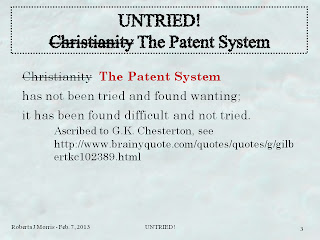I had used the quotes in some recent talks (Oregon Patent Bar 2012, slide 12; and Stanford faculty lunch half-talk, slide 22). Today Greg Aharonian's newsletter inspired me to put the quotes together in a separate document and post them here. Greg wrote about the Federal Reserve economists who are proposing abolition of the patent system. They undoubtedly did it to get attention, and will succeed, and to avoid the real work of determining how to help the economy in ways the Federal Reserve can accomplish.[n1] Like too many employees at _____ [fill in the name of your current employer or other appropriate entity], these economists may have forgotten why they were hired. Or maybe they never knew.
[n1] A Constitutional amendment would be required to abolish patents [see Art. I, sec. 8, cl. 8], and under the Constitution neither the power to propose amendments nor to ratify them is given to the Federal Reserve [see Art. V].)
I have long said - well, not exactly in these words -
"Let's let the PTO put all its effort into making sure applications are valid over the prior art. [n2] That would utilize the examiners' supposed expertise. And then let's wait,say, 5 years before we decide that the patent system is irretrievably dreadful. That is, let's TRY having a patent system instead of fussing around with irrelevancies like patentable subject matter."
[n2] A little amplification for those who know something about patent law and the patent system: What I mean is that examiners should issue rejections *ONLY* on 102 and 103 [35 USC 102 and 103, requiring patents to be valid over the prior art, aka the novelty and obviousness requirements]. OK, for claims to perpetual motion machines for which there is no prior art (ha), they can reject under 112 [35 USC 112, requiring patents to be written so that an ordinary artisan in the field is enabled to make and use them, aka the enablement requirement], too.
Really, if the PTO does not give a high priority to examining patent claims for validity over the prior art, it should not require a technical background of its examiners. There are many smart liberal arts majors who would be just as good as engineers, maybe better, at deciding if a claim is drawn to "patentable subject matter," or anyway writing at length about it, especially if they have already considered how many angels can dance on the head of a pin.
For more of my views on the PTO's expertise and the role of prior art, see among other things my In re Bilski amicus brief, Microsoft v i4i amicus brief, blog post about Bilski when it was pending before the Supreme Court (see [n24] and accompanying text for a discussion of angels dancing on the head of a pin), and my comments on the PTO's Interim Guidance after Bilski.
Broken link fixed and typo corrected 20140402



No comments:
Post a Comment